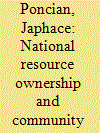| Srl | Item |
| 1 |
ID:
104435


|
|
|
|
|
| Publication |
2011.
|
| Summary/Abstract |
The global governance of extractive resources has largely been shaped by the energy-security agenda of industrialized countries. It is patchy and does not properly address the specific concerns of producer, consumer, and transit countries. Rising demand coincides with a looming peak of oil production and climate change. This requires urgent and resolute collective action, which is hampered by a disconnect between geological and political temporality and realities. Extractive industries, investors, civil society, international organizations, and consumer countries can jointly provide significant political and market incentives to avert the resource curse in resource-rich, but weak states. This calls for an appropriate institutionalization of voluntary multistakeholder initiatives with greater engagement on the part of emerging economies.
|
|
|
|
|
|
|
|
|
|
|
|
|
|
|
|
| 2 |
ID:
168662


|
|
|
|
|
| Summary/Abstract |
Extractive resources politics in many resource rich countries remain contentious due to complex relations between resource owners on the one hand and the investors on the other hand. Recent policy reforms in Tanzania have been enacted to bring the development of energy resources under the control of the national government. The impact of these policy changes on the politics of participatory resource governance in terms of local community engagement in decision making and governance processes has not received much scholarly attention. This paper explores how the government's policy of national ownership shapes community engagement in decision making processes in the gas rich regions of Mtwara and Lindi. The paper draws on government documents, media reports as well as interviews with local communities, local government leaders and officials and central government officials. It argues that the policy framework for national ownership of natural gas is used by the government to thwart grassroot community initiatives for participation in decision making processes.
|
|
|
|
|
|
|
|
|
|
|
|
|
|
|
|